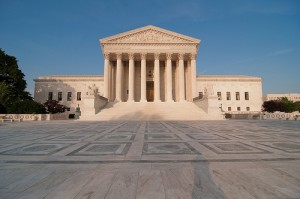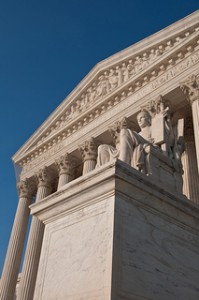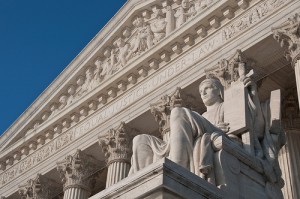Posted
08 Jan 2014 in Case Notes, IMLA Briefs
Local governments often establish fixed buffer zones to eliminate congestion and to ensure public safety. Does the First Amendment require a significant change in current local practices?

Next Wednesday, January 15th, the Supreme Court will hear arguments in a case that could address that question.
McCullen v. Coakley, No. 12-1168 concerns whether a Massachusetts law that bars entering or remaining within a 35-foot radius of a reproductive-health-care facility violates the First Amendment. The First Circuit
upheld the law as a reasonable, content-neutral limit.
Local governments have filed two important amicus curiae briefs in the case.
First, IMLA joined the National League of Cities, National Association of Counties, the International City/County Management Association, and the U.S. Conference of Mayors in a
brief urging the Court to respect state and local governments' need to establish buffer zones to protect public safety. The brief offers a number of examples
 Taxpayer Y pays more in taxes because she pays income taxes out-of-state and pays a county income tax in her home state. Unfair? (Not necessarily. After all, Taxpayer Y receives government services in the county where she resides.) Unconstitutional? The Supreme Court will decide.
The Supreme Court hasn’t decided a state and local government tax case since Armour v. Indianapolis, during the Court’s 2011 term. In Comptroller v. Wynne it will decide an issue of first impression: whether a state must offer a credit to its residents for all income taxes paid to another jurisdiction. A decision against Maryland’s Comptroller would limit state and local taxing authority nationwide.
Taxpayer Y pays more in taxes because she pays income taxes out-of-state and pays a county income tax in her home state. Unfair? (Not necessarily. After all, Taxpayer Y receives government services in the county where she resides.) Unconstitutional? The Supreme Court will decide.
The Supreme Court hasn’t decided a state and local government tax case since Armour v. Indianapolis, during the Court’s 2011 term. In Comptroller v. Wynne it will decide an issue of first impression: whether a state must offer a credit to its residents for all income taxes paid to another jurisdiction. A decision against Maryland’s Comptroller would limit state and local taxing authority nationwide.





 By Lisa Soronen [We are thrilled to have a guest post from Lisa Soronen, executive director of the
By Lisa Soronen [We are thrilled to have a guest post from Lisa Soronen, executive director of the 
